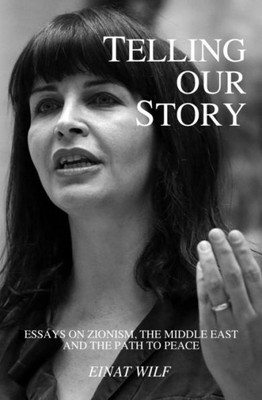
Telling Our Story : Recent Essays On Zionism, The Middle East, And The Path To Peace
CreateSpace Independent Publishing Platform
ISBN13:
9781983993657
$12.20
The story of Israel and Zionism has been hijacked, disfigured, and trampled upon. It has been deliberately replaced by a story about sinister ideologies and evil motivations. When this tale of evil becomes the reigning story, peace becomes ever less possible, since evil is not to be negotiated with, but defeated. If peace is ever to be made, the story of Israel and Zionism is to be told anew. In this book, Dr. Einat Wilf does just that, demonstrating in the process how the true telling of the story of Israel and Zionism opens the path to peace with the Palestinians and the entire Arab and Muslim world. In the book's opening chapter, "Telling Our Story," Wilf provides a context, telling the story of the Jewish people's right to self-determination in their homeland and how through deliberate Jewish action - not foreign hand-outs or Holocaust-motivated guilt - the State of Israel was born. This story of the Zionist movement remains among the most inspiring dramas in human history: although dealt some of the worst cards in history, through force of vision, desire and work, the Jewish people returned to history as active agents and shaped a future in which they are not the victims of others. This story is crucial to understanding the importance of the Jewish state to the Jewish people, as well as in its broader ability to inspire people throughout the world. In chapter two, "On Why There Is No Peace," Wilf examines why decades after the establishment of the State of Israel conflict continues to persist with no end in sight. The core of her argument is that the requisite condition for any solution - whether it be a one-state or two-state solution - is for both sides of the conflict to recognize the equal rights of the other as collectives and individuals to all of the land, and the acceptance that neither can have the land in its entirety. As this requisite is absent - specifically on the Arab side - compromise, and thereby peace, has not been viable. In chapter three, "On What Israel Should Do," Wilf explores the steps Israel should take towards peace. Wilf argues that although peace may not be viable now, Israel should prepare for the hopeful eventuality of the creation of two states for two peoples between the Mediterranean Sea and Jordan River. Israel should do this by specifically delineating its eastern border - including the annexation of the large Jewish settlement blocks that are contiguous to the Green Line - and renouncing is territorial claims beyond that eastern border. Given the very real security issues that Israel faces, however, she should implement a policy of continued military occupation until she feels there is a partner for peace on the Palestinian side. This policy is one of "yes to the occupation, no to the settlements," east of that border. Regarding Jerusalem, Wilf clarifies that the only place where controversy persists is in regard to the Old City. The status of the Old City will be determined through a final peace agreement, but the status of the overwhelming majority of Jerusalem can already be specified; and that final peace agreement, Wilf explains, would be in a much better position if the ambiguity regarding the Old City did not spill over into the issue of Jerusalem as a whole. In the concluding chapter, "On What the International Community Should Do," Wilf explores what roles and policies might be pursued by the international community. Foremost, however, Wilf posits that it is critical for the international community to understand that the conflict between Israelis and Palestinians, between Jews and Arabs in the Middle East, rests on serious issues that go to the core of matters of each other's sense of justice, history, and identity. Additionally, it is most important to bear in mind that Israelis, Palestinians, and Arabs are sovereign agents who need to determine their future for themselves and by themselves.
- | Author: Einat Wilf, Ayelet Kahane
- | Publisher: Createspace Independent Publishing Platform
- | Publication Date: Mar 19, 2018
- | Number of Pages: 224 pages
- | Language: English
- | Binding: Paperback
- | ISBN-10: 1983993654
- | ISBN-13: 9781983993657
- Author:
- Einat Wilf, Ayelet Kahane
- Publisher:
- Createspace Independent Publishing Platform
- Publication Date:
- Mar 19, 2018
- Number of pages:
- 224 pages
- Language:
- English
- Binding:
- Paperback
- ISBN-10:
- 1983993654
- ISBN-13:
- 9781983993657





